|
|
|
Sort Order |
|
|
|
Items / Page
|
|
|
|
|
|
|
| Srl | Item |
| 1 |
ID:
174211


|
|
|
|
|
| Summary/Abstract |
This article examines the origins of the Chinese seductress-spy to further existing literature on women and war, female archetypes and espionage in China. The diffusion of knowledge about women such as Mata Hari from the West to Republican China (1911–1949) developed a new female archetype that was neither Chinese nor Western, but both Chinese and Western. Instead of seeing Chinese seductress-spies as equivalent to their Western counterparts, we should see them as a uniquely gendered nationalist construct that had roots in the Japanese, English, as well as Chinese understanding of the role of women during wartime situations.
|
|
|
|
|
|
|
|
|
|
|
|
|
|
|
|
| 2 |
ID:
177968
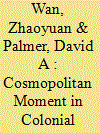

|
|
|
|
|
| Summary/Abstract |
This article outlines the spread of the Bahá’í religion—known in Chinese as Datong jiao 大同教)— as a form of religious cosmopolitanism in Republican China (1912–1949). Originating in Iran, its spread to China can be traced to links with the Ottoman empire, British Palestine, the United States, and Japan. By tracking the individuals, connections, and events through which knowledge of the Bahá’í movement spread in China, our study reveals an overlapping nexus of networks—intellectual reformers, liberal Christians, Esperantists, Confucian modernizers, redemptive society activists, and socialists—that shared cosmopolitan ideals. The Bahá’í connections thus serve as a thread that reveals the influence of a unique ‘cosmopolitan moment’ in Republican China, hitherto largely ignored in the scholarly literature on this period, which has focused primarily on the growth of modern Chinese nationalism. Leading nationalist figures endorsed these movements at a specific juncture of Asian colonial modernity, showing that nationalism and cosmopolitanism were seen as expressions of the same ideal of a world community. We argue that the sociology of cosmopolitanism should attend to non-secular and non-state movements that advocated utopian visions of cosmopolitanism, map the circulations that form the nexus of such groups, and identify the contextual dynamics that produce ‘cosmopolitan moments’ at specific historical junctures and locations.
|
|
|
|
|
|
|
|
|
|
|
|
|
|
|
|
| 3 |
ID:
190402
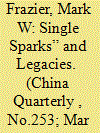

|
|
|
|
|
| Summary/Abstract |
The watershed in modern Chinese politics known as the May Fourth Movement (1919) offers insights into how a single protest event can quickly diffuse to other regions, draw in new participants and produce legacies in contentious politics. This article examines the May Fourth protests from the perspective of “eventful sociology” – an approach that examines how protests, repression and other contingent events link together to bring about landmark political episodes. It traces the sequence of protest and repression events in Beijing and draws on an original database of protest and repression events in Shanghai to emphasize the haphazard sequencing of actions and information flows that led the Chinese government to reverse its stance and concede to protestors’ demands. An eventful account illustrates how past protest sequences can produce a long-term impact on subsequent protest events. It also calls for greater awareness of “single sparks” that initiate protest sequences and unexpected political outcomes.
|
|
|
|
|
|
|
|
|
|
|
|
|
|
|
|
| 4 |
ID:
152034
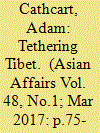

|
|
|
|
|
| Summary/Abstract |
Before Liu Shengqi (柳陞祺) became the early PRC's foremost historian of Tibet, he was an English-language secretary in Lhasa for the Nationalist Government's Commission on Mongolia and Tibet. His travels and assessment of Han-Tibetan relations in and around Lhasa provide a unique perspective on Tibet's tenuous relationship with the Chinese central government from 1945 until 1949. With the 2010 publication of Liu's recollections in Lhasa (in Chinese), a new window is opened on the literature on Tibet's history -- and assertions of Guomindang power in the region -- in the period just preceding the traumatic collision with Maoism.
|
|
|
|
|
|
|
|
|
|
|
|
|
|
|
|
| 5 |
ID:
139690
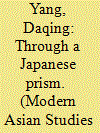

|
|
|
|
|
| Summary/Abstract |
This paper examines the key modern infrastructure of telecommunications in early Republican China, through the eyes of a Japanese, Nakayama Ryûji, who served as a telecommunications adviser to the Chinese government from 1913 to 1928. Nakayama's numerous reports and recommendations to his Chinese employer and frequent confidential dispatches to the Japanese government, when read together, constitute a fascinating prism. They not only reveal problems as well as the potential in China's telecommunications sector, they also highlight Japan's efforts to compete with other foreign actors in China through the provision of Japanese equipment, expertise, and loans. While Nakayama strove to shape China's telecommunications development in ways that would, in his view, benefit both China and Japan, his efforts were often undercut by the aggressive actions of the Japanese government in China, such as the infamous Twenty-One Demands. Though promising at first, Japan's influence on China's modernization in the early Republican era came to be more limited, especially when compared with the final decade of the Qing Dynasty. Ultimately, what can be seen through this Japanese prism confirms that the development of an information infrastructure in modern China, as elsewhere, was as much shaped by technological and economic forces as it was influenced by political and diplomatic factors.
|
|
|
|
|
|
|
|
|
|
|
|
|
|
|
|
| 6 |
ID:
174504
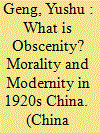

|
|
|
|
|
| Summary/Abstract |
This paper examines the debates over the meaning of obscene (yin 淫) in 1920s China. Although the censorial category yinshu (淫书 obscene books) long existed in imperial China, in the late 1910s and 1920s, commonly known as the May Fourth era, the meaning and content of this genre underwent intriguing changes following Chinese intellectuals’ quest for enlightenment and modernity. As Kendrick Walter has insightfully remarked in his study of pornography in Western modern culture, “Pornography names an argument, not a thing” (1987: 31). The argument over the meaning of yin offers a unique perspective into the complicated relationship between science, morality, and modernity in Republican China.
|
|
|
|
|
|
|
|
|
|
|
|
|
|
|
|
|
|
|
|
|